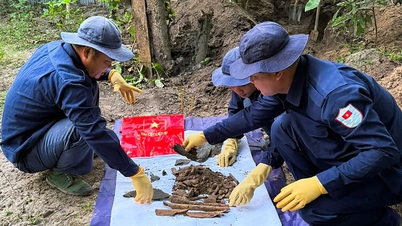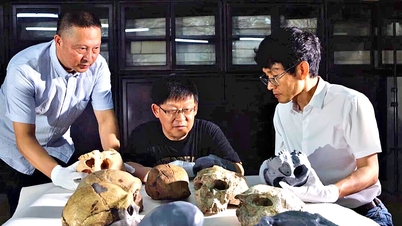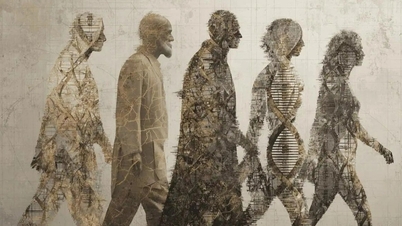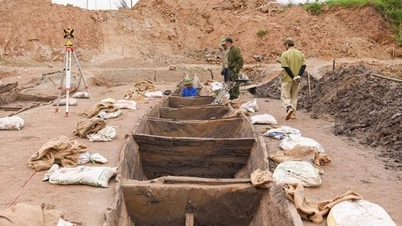(NLDO) - Fossilized remains dating back up to 300,000 years have just been excavated in China, promising to rewrite the history of human evolution.
According to Xinhua News Agency, the fossil remains were excavated at a famous site called Hualongdong Cave in Dongzhi County, Anhui Province, China.
Discovered in late 1988, the Hualongdong site has yielded remarkable finds since excavation began in 2013, with about 20 ancient human fossils found.
The site also yielded more than 400 stone artifacts, many bone fragments with evidence of human cutting and chopping, as well as more than 80 vertebrate fossils.
In the latest excavation from April to November 2024, scientists found the fossilized remains of 11 people in an excavation area of just 40 square meters inside the cave.

Hualongdong Cave is where dozens of Homo sapiens remains as well as Homo erectus - Homo sapiens transitional individuals were found - Photo: TAN HOA XA
These skeletons are not intact, but overall they contain many different body parts that are very well preserved, including skull fragments, femurs, foot bones...
This has helped Chinese scientists discover the nature of the people who lived here: They had physical characteristics that were a mix of Homo erectus and Homo sapiens.
More specifically, they seem to represent a class of humans that were halfway through their evolution from Homo erectus to our species!
This matches analysis of a 13-14 year old girl's skull excavated in 2015 at the same site.
The skull has a unique mix of primitive and modern features, with a face and jawline that suggest she wasn't quite like us, but appeared to be evolving into us.
Homo erectus and Homo sapiens are two species of the same genus Homo (Human). Homo sapiens is us humans and is the only species of this genus that is not extinct.
There is evidence worldwide that Homo sapiens may have been a species that split off more than 300,000 years ago from a branch of Homo erectus.
However, most scientists believe that this evolution took place in Africa. It was not until 60,000-100,000 years ago that the first groups of Homo sapiens left Africa and spread across Eurasia.
Therefore, the new discovery in China may point to an unknown migration and evolutionary path in East Asia, promising to provide many missing pieces to the human evolutionary puzzle.
The 11 individuals discovered belonged to a large family of 20, said Wu Xiujie, a researcher from the Institute of Vertebrate Paleontology and Paleoanthropology (IVPP) of the Chinese Academy of Sciences (CAS), who led the excavation team.
Life inside their caves was quite organized like ours today, with a separate dining room used for cutting, slicing and preparing food; as well as a sleeping area in a safe area to guard against wild animals.
The finely crafted stone tools found at Hualongdong also show a relatively high level of technical skill among the people who lived here 300,000 years ago.
"They were very intelligent and evolved in stages to become Homo sapiens," Ms. Wu commented.
Source: https://nld.com.vn/phat-hien-11-bo-hai-cot-tien-hoa-do-dang-thanh-nguoi-hien-dai-19624121009251725.htm







![[Photo] Cat Ba - Green island paradise](/_next/image?url=https%3A%2F%2Fvphoto.vietnam.vn%2Fthumb%2F1200x675%2Fvietnam%2Fresource%2FIMAGE%2F2025%2F12%2F04%2F1764821844074_ndo_br_1-dcbthienduongxanh638-jpg.webp&w=3840&q=75)







































































































Comment (0)